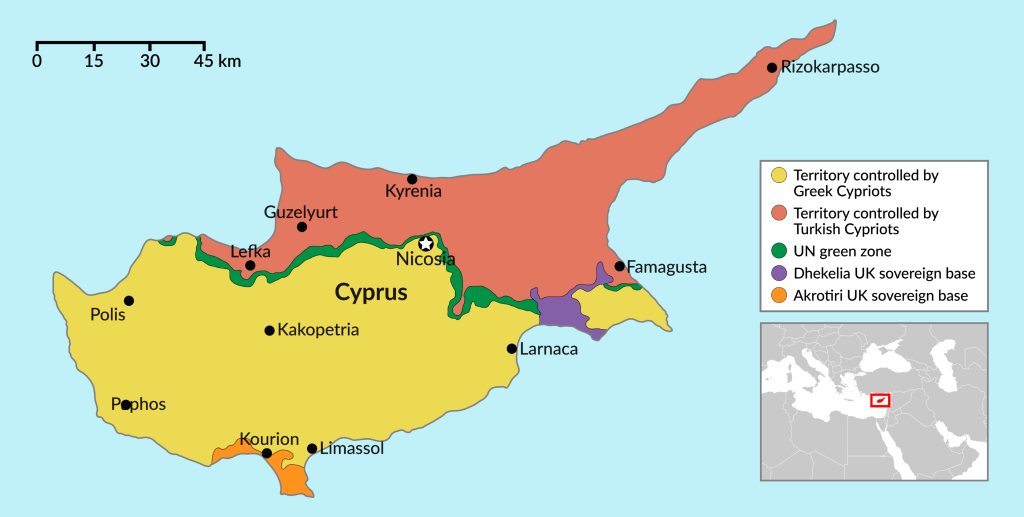
“Taksim,” a two-state solution for Cyprus proposed in 1957, is one of the impractical solutions for the state of Cyprus that Turkey revived in 2021. The backing of Turkish Cypriots since 1974 and the 1983 unilateral declaration of independence under the Turkish Republic of Northern Cyprus (TRNC) can be regarded as one of the political leverages against Greece and Cyprus. Paradoxically, the Greek part of Cyprus is performing well despite 50 years of Turkish occupation.
By Ahsan Ali
Turkey is depicted as the protector of the Turkish Cypriot community, with a large army, a substantial budget, and significant trade and monetary dependence. It enforced the relocation of Turkish settlers from conservative, rural, and poorer regions of Turkey in violation of Article 49(6) of the Fourth Geneva Convention (1949).
Turkish settlers leveraged the political support for the pro-Ankara candidates in the elections by backing Ankara’s stance on Cyprus. Turkish Cypriots tend to favour reintegration and reunification with Cyprus, with equal political rights under a federal structure.
There have been six initiatives under the federal structure aimed at reunifying Cyprus, but all have failed to date. The reconciliation attempts have fallen apart with different issues, particularly on power-sharing and property, alongside the removal of Turkish settlers and troops.
The dynamics changed in 2021, with President Recep Tayyip Erdogan and former TRNC President Ersin Tatar promoting the two-state solution, rejecting the federal model. The two-state solution used by Turkey to shift the negotiation baseline and recognise Turkish Cypriots as equal partners rather than a minority.

The two-state solution appeals to conservative and nationalist voters in the TRNC, who distrust reunification, seek a strategic geopolitical foothold, and maintain the status quo of Turkish dependency. The solution is an improbable peace plan, rather more as a political instrument to preserve control, leverage, and reshape negotiations with sovereign equality.
In the two-state solution, Turkish Cypriots and Turkish settlers hold different opinions and positions. Turkish Cypriots identify with the indigenous community, seeking political rights and EU integration. Meanwhile, Turkish settlers align with Turkish nationalist policies and even support the idea of partition, which strengthens Ankara’s position.
The two-state solution seems to be a political manoeuvre by Turkey, as the identity of Turkish Cypriots is different from that of Turkish settlers, being secular, modern, and pro-EU. The two-state solution in the Cyprus scenario is politically unrealistic, irrational, and an undeveloped thought for the Turkish Cypriots.
The Muslim and ethnic identity argument in the scenario is unreasonable for the separation, as the Cyprus issue is embedded in political power-sharing, security, community trust, and territorial disputes rather than ethnic or religious incompatibility.
Internationally, UN Resolutions 541 and 550 block any international recognition of the TRNC, except Turkey, which is the only state to recognise the TRNC. Without broader acceptance and in defiance of UN resolutions, the two-state solution is an unrealistic political proposition with a weak foundation.
The TRNC’s position on a two-state solution within the Organisation of Turkic States is strengthened by President Erdogan's enhanced posture as an observer. Meanwhile, in reality, it lags in the recognition, legitimacy, and practical implementation of the groundwork for the two-state solution.
The “Taksim” two-state solution would be the inevitable solution for the Cyprus issue. Henceforth, the TRNC’s new government must focus on reconciliation, reintegration, and reunification with the Greek Cyprus.
With the recent election victory of pro-reunification leader Tufan Erhurman, the revival of reunification has ignited again and was welcomed by Greek Cypriot President Nikos Christodoulides. He expressed readiness for the federalist structure that the UN and the European Union support.
President Tufan’s stance on reunification and federalism may differ from Ankara’s position, highlighting a potential divergence in their political futures. The mainland Turkish nationalist strategic agenda prioritises Ankara’s influence, securing military and economic control, and using the two-state solution as leverage at the expense of Turkish Cypriot sovereignty and long-term political ambitions.
President Tufan’s mediation process with President Nikos, while taking Turkey into confidence, is due to the TRNC’s economic dependence on Turkey. Before the mediation efforts, President Tufan may need to convince President Erdogan to reconsider his stance on the “two-state solution.” Only then can there potentially be a breakthrough on the Cyprus issue.





